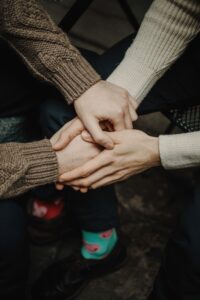What is love?
Don’t start singing that nonsense 90s song at me. I want a serious answer. Because this is a question which has haunted me for most of my life. What is love and what does beloved actually mean?
I say “haunted” because most of the definitions of love I’ve heard are completely alien to my life experience.
“Love is when just being with someone makes you happy.”
“Is love is smiling whenever you think of someone.”
“Love is gleeful butterflies in your stomach.”
“Is love is wanting your beloved to be happy, even at your expense?”
“Grief is the price of love.”
“When you love someone, you feel their pain as if it were your own.”
I simply don’t have these emotional reactions. Part and parcel of being a psychopath. It’s kinda baked into the definition.
My story...
When I was young I didn’t even understand what people were talking about. (At least in part because people rarely give proper definitions, they just make vague references or talk around the meaning.) So, to me, ‘love’ was a list of rules. If you love someone, you behave in these ways. Therefore, behaving in these ways means you love that person. Nice and simple, at least once you’ve memorised all the rules.
Which I did, carefully and diligently, and was confident that I was a loving person.
Until I blithely revealed what I was doing, and an adult kindly (well, I’m pretty sure they thought they were being kind) informed me that love isn’t rules or behaviours, it’s a feeling. ‘Loving behaviours’ weren’t an established category, they were simply behaviours prompted by this mysterious fuzzy feeling. If the behaviour wasn’t spontaneous, wasn’t you unthinkingly following this vital inner force, it didn’t count.
I cannot adequately convey how crushing this casual explanation was. Because what this meant, what they were effectively telling me, is that I cannot love.
No matter how hard I try.
It doesn’t matter how much thought I put into it. Or how much studying I do on the topic.
It doesn’t matter how desperately I want to love people.
No matter what my love doesn’t count.
This was particularly troubling given what I’d absorbed from the media about people who were supposedly loveless. These people were always sad, evil, or both. Especially in children’s stories, characters who are full of love are wonderful while characters without love are irredeemable. In fact, the only way they are ever redeemed is by finding out that they can love after all. Which I’d just been confidently informed I couldn’t.
Believing that you’re an irredeemable monster doomed to be constantly miserable and alone is a heavy burden to shoulder when you’re seven years old.
As I got older...
Though it didn’t get easier as I got older. In fact, when I hit puberty it got worse because I discovered I was a-romantic and asexual on top of my other divergences, so now the list of emotional/physiological responses I was meant to have and didn’t was like three times as long.
The media aimed at my age group was suddenly obsessed with love (and subsequently most of my peers were too), in several different flavours but mostly romantic, which our society holds up as the greatest and most important kind of love. Finding your other half, your soul mate, your “true love”, is meant to be the highlight of your entire life.
Realising that this isn’t an option for you, therefore, leaves you… adrift. Alone. At a loss.
And, at least in my case, scared of what the consequences would be if the people around me found out. Because I had never seen a happy ending for someone who remained loveless, and in fact, the general advice regarding people who turn out not to love you back is to immediately sever all ties with them.
While this prospect wasn’t as terrifying as when I was a child, it was still immensely painful to contemplate. The people around me add so much value to my life. I delight in hanging out with my friends. I am endlessly grateful for the support I get from my family. I find cultivating connections with people I share interests intensely rewarding.
But apparently, that was all worthless because I don’t have this magic warm fuzzy feeling driving it. In fact, plenty of sources bitterly decried what I was doing. By entrapping people in fake relationships using forced or manipulative behaviours, I was a villain. It didn’t matter if we were both happy in this arrangement, what mattered is that they had the magic feeling and I didn’t, so my actions, however positive they might seem, however well-intentioned they might be, were wicked.
So, there I was. Convinced that I was evil, because I didn’t experience a particular class of emotional reactions yet wanted to connect with people anyway. And unable to talk about it, for fear of them being furious at my using them and seeking revenge or abandoning me.
Fortunately, I found counter-dialogues.
A good read...
Perhaps the best was in Braiding Sweetgrass, by Robin Wall Kimmerer. If you get nothing else out of this, please go buy as many of her books as you can and read them. Her work is incredible, and it irks me that I will never be able to properly thank her, either for what she does for humanity in general or for what her work means to me personally.
One of the core threads running through her work is the concept of reciprocation. The idea is that if you accept a gift you also accept an obligation to the giver. Not a debt, not a tangible, precise burden that can be measured in pounds and pence. An obligation. A connection. There is now a link between you. And she talks of love being embracing that link, fostering that connection, and being willingly connected to another.
That is a definition which is accessible to me. A definition I understand. Finally, finally, someone was talking about love while speaking my language.
In chapter twelve she asserts, perfectly seriously, that she loves her garden… and that her garden loves her back. Not because she thinks it has some gestalt consciousness, or that her plants experience endorphin boosts due to her proximity, but instead because she applies loving behaviour to her garden, and the garden reciprocates in kind.
She nurtures the health of the soil and plants, they nurture her health by providing nutrient-dense foods. She gives time and energy and so do they. In doing so, she works together with her garden towards a common goal; the propagation of plant genetics packaged in tasty parcels.
This was exactly the kind of arrangement which I was used to seeing decried as selfish, manipulative, and fake. But she argues that a relationship isn’t fake just because the motivation for entering into the relationship is looking after your own well-being. If anything, this is an example of healthy love; everyone gives, and everyone gets, and all involved are better off for the arrangement.
It was deeply validating and reassuring to see a definition of love centred on being loving, just as I had deduced when I was small. Tiny me wasn’t being silly, ne was onto something! Because, after all, other people can’t feel your warm fuzzy magic feelings.
While loving seemed focused on mysterious alien inner feelings, being loved is about how someone behaves towards you. That’s also the difference between being loved and being “beloved” – someone can love you (at least in the sense of fuzzy magic warmth) without you knowing, whereas when you are beloved their care for you is clearly communicated.
And that means by accepting people’s care, nurturing, and support, I was beloved. And by doing my best to reciprocate these gifts, I was loving. Which is what I’d always desperately wanted.
For me...
For me,‘love’ is about valuing what a person brings to my life, and showing that by doing what I can to bring value to their life. “Love” is a long shared history of positive behaviours. “Love” is wanting someone to feel as wonderful as they seem to me. “Love” is accepting gifts of care and kindness, rejoicing, and giving back. Over and over and over, everyone involved is better off for the arrangement.
And if that “doesn’t count”, or “isn’t real love”, or makes me “manipulative”… fine. It brings much joy to me and to those around me.
Right now, I can confidently say that I am beloved, and there are many people beloved to me.
How can that not be enough?

Lee Heywood
MBS Admin Team








